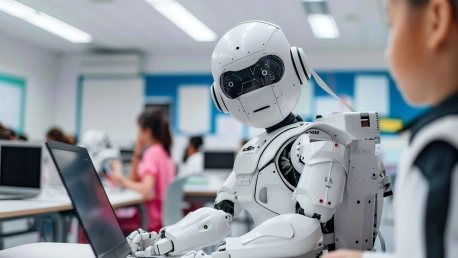The dawn of AI in various sectors has not spared the field of education. In classrooms across the United States, tools like ChatGPT are becoming more prevalent, initiating a spectrum of responses from K-12 educators. The Pew Research Center’s comprehensive survey conducted in the fall of 2023 has shed light on the opinions and concerns of these educators regarding the infusion of AI into educational environments. As technology continues to advance, understanding the impact of AI on learning and teaching methods is crucial for the evolution of K-12 education.
Educators’ Apprehensions and Hopes
With the integration of AI into teaching approaches, a considerable number of educators feel wary, unsure whether AI will benefit or hinder the learning process. The Pew Survey reveals that a quarter of K-12 educators view AI’s integration with skepticism, fearing its potential drawbacks. High school teachers, in particular, are more likely to doubt the efficacy of AI in education, with 35% questioning its positive influence. This wariness suggests that the stakes might be higher for older students, whose educational needs and learning complexities are more acute.On the flip side, there’s a segment of the educator population that recognizes the promise of AI in the classroom. Less than 10% of the surveyed teachers are optimistic about AI playing a beneficial role. However, a notable one-third of educators find themselves straddling the fence, acknowledging both potential advantages and disadvantages. This ambivalence speaks volumes about the current understanding of AI’s role in education and drives home the need for a deeper exploration of AI’s educational potential alongside its limitations.
Divergent Views Across Educational Levels
Educators’ perceptions of AI are not uniform across all school levels. The Pew Research Center’s findings disclose a divide in opinion that correlates with the grades being taught. High school educators tend to be more skeptical about the integration of AI, suggesting a different valuation of AI’s role or greater concerns about its implications as students prepare for life after graduation. Middle and elementary school teachers are comparatively less doubtful, yet not entirely convinced about the benefits of AI.The most pronounced uncertainty is found at the elementary level, where close to 50% of educators are undecided about AI’s impact on education. This reveals the complexity of introducing advanced technologies into the foundational stages of a child’s educational journey. These diverse viewpoints accentuate the intricate considerations that must go into deploying AI applications in various educational contexts.
Student Engagement with AI Tools
The rising tide of AI adoption has also reached the student body, with teenagers increasingly turning to platforms like ChatGPT to assist with their schoolwork. According to the survey, 19% of students have employed AI to support their academic tasks, which is indicative of how ingrained AI tools are becoming in the learning process. Teens show discernment in how they utilize AI, with the majority of approval directed towards conducting research, while activities such as essay writing garner less enthusiasm.This selective use suggests a savvy engagement with AI among students, who seem to weigh the appropriateness and potential benefits against their educational goals. The mixed approach to employing AI tools in academic work mirrors a broader conversation about the ethics and practical implications of AI in education. As AI continues to weave itself into the fabric of school life, the dialogue surrounding its appropriate use grows ever more pertinent.
The Road Ahead for AI in K-12 Education
AI technologies like ChatGPT are increasingly making their way into U.S. classrooms, and a recent fall 2023 Pew Research Center survey provides insight into K-12 educators’ attitudes toward this change. The survey illuminates a range of reactions as teachers grapple with the implications of integrating AI into educational settings. As AI progresses, it’s essential to monitor its effects on teaching and learning to guide the development of K-12 education. Educators express a mixture of anticipation and concern, highlighting AI’s potential to innovate alongside worries about its impact on fundamental teaching practices. Understanding these perspectives is critical in steering the future of education in an era where AI presence is growing.









